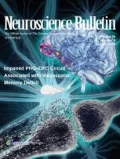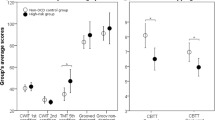Abstract
Objective
The existence of neuropsychological deficits has been implicated in obsessive-compulsive disorder (OCD), particularly memory, attention, and executive functions. However, few studies have focused on neuropsychological deficits in the relatives of OCD patients. The aim of this study was to investigate cognitive deficits in OCD patients and their parents.
Methods
Forty patients with OCD, 48 parents of these patients, and 87 healthy controls completed a neuropsychological testing battery.
Results
Both OCD patients and their parents showed impairments in delayed verbal memory and delayed visual memory. Furthermore, they performed worse than healthy controls in problem-solving ability.
Conclusion
Our study demonstrated familial aggregation of delayed memory deficits and impaired problem-solving ability, which may be the potential neuropsychological endophenotypes of hereditary susceptibility to OCD.
Similar content being viewed by others
References
Weissman MM, Bland RC, Canino GJ, Greenwald S, Hwu HG, Lee CK, et al. The cross national epidemiology of obsessive compulsive disorder. The Cross National Collaborative Group. J Clin Psychiatry 1994, 55: 5–10.
Greisberg S, McKay D. Neuropsychology of obsessive-compulsive disorder: a review and treatment implications. Clin Psychol Rev 2003, 23: 95–117.
Chamberlain SR, Blackwell AD, Fineberg NA, Robbins TW, Sahakian BJ. The neuropsychology of obsessive compulsive disorder: the importance of failures in cognitive and behavioural inhibition as candidate endophenotypic markers. Neurosci Biobehavl Rev 2005, 29: 399–419.
Chamberlain SR, Fineberg NA, Menzies LA, Blackwell AD, Bullmore ET, Robbins TW, et al. Impaired cognitive flexibility and motor inhibition in unaffected first-degree relatives of patients with obsessive-compulsive disorder. Am J Psychiatry 2007, 164: 335–338.
Menzies L, Achard S, Chamberlain SR, Fineberg N, Chen CH, del Campo N, et al. Neurocognitive endophenotypes of obsessive-compulsive disorder. Brain 2007 130: 3223–3236.
Viswanath B, Janardhan Reddy YC, Kumar KJ, Kandavel T, Chandrashekar CR. Cognitive endophenotypes in OCD: A study of unaffected siblings of probands with familial OCD. Prog Neuropsychopharmacology Biol Psychiatry 2009, 33: 610–615.
Cavedini P, Zorzi C, Piccinni M, Cavallini MC, Bellodi L. Executive dysfunctions in obsessive-compulsive patients and unaffected relatives: searching for a new intermediate phenotype. Biol Psychiatry 2010, 67: 1178–1184.
Segalàs C, Alonso P, Real E, Garcia A, Miñambres A, Labad J, et al. Memory and strategic processing in first-degree relatives of obsessive compulsive patients. Psychol Med 2010, 40: 2001–2011.
Rajender G, Bhatia MS, Kanwal K, Malhotra S, Singh TB, Chaudhary D. Study of neurocognitive endophenotypes in drug-naïve obsessive-compulsive disorder patients, their first-degree relatives and healthy controls. Acta Psychiatr Scand 2011, 124: 152–161.
Savage CR, Deckersbach T, Wilhelm S, Rauch SL, Baer L, Reid T, et al. Strategic processing and episodic memory impairment in obsessive compulsive disorder. Neuropsychology 2000, 14: 141–151.
Deckersbach T, Otto MW, Savage CR, Baer L, Jenike MA. The relationship between semantic organization and memory in obsessive-compulsive disorder. Psychother Psychosom 2000, 69: 101–107.
Kuelz AK, Hohagen F, Voderholzer U. Neuropsychological performance in obsessive-compulsive disorder: a critical review. Biol Psychol 2004, 65: 185–236.
Purcell R, Maruff P, Kyrios M, Pantelis C. Cognitive deficits in obsessive-compulsive disorder on tests of frontal-striatal function. Biol Psychiatry 1998, 43: 348–357.
Okasha A, Rafaat M, Mahallawy N, EI Nahas G, EI Dawla AS, Sayed M, et al. Cognitive dysfunction in obsessive-compulsive disorder. Acta Psychiatr Scand 2000, 101: 281–285.
Cavedini P, Cisima M, Riboldi G, d’Annucci A, Bellodi L. A neuropsychological study of dissociation in cortical and subcortical functioning in obsessive-compulsive disorder by Tower of Hanoi task. Brain Cogn 2001, 46: 357–363.
Olley A, Malhi G, Sachdev P. Memory and executive functioning in obsessive-compulsive disorder: A selective review. J Affect Disord 2007, 104: 15–23.
American Psychiatric Association. Diagnostic and Statistical Manual Mental Disorders, 4th ed. Washington, DC: APA, 1994.
Goodman WK, Price LH, Rasmussen SA, Mazure C, Fleischman RL, Hill CL, et al. The Yale-Brown Obsessive Compulsive Scale. I. Development, use, and reliability. Arch Gen Psychiatry 1989, 46: 1006–1011.
Williams JB. A structured interview guide for Hamilton Depression Rating Scale. Arch Gen Psychiatry 1988, 45: 742–747.
Sheehan DV, Lecrubier Y, Sheehan KH, Amorim P, Janavs J, Weiller E, et al. The Mini-International Neuropsychiatric Interview (MINI): the development and validation of a structured diagnostic psychiatric interview for DSM-IV and ICD-10. J Clin Psychiatry 1998, 59: 22–33.
Lee TM, Chan CC. Stroop interference in Chinese and English. J Clin Exp Neuropsychol 2000, 22: 465–471.
Zitterl W, Urban C, Linzmayer L, Aigner M, Demal U, Semler B, et al. Memory deficits in patients with DSM-IV obsessive-compulsive disorder. Psychopathology 2001, 34: 113–117.
Trivedi JK, Dhyani M, Goel D, Sharma S, Singh AP, Sinha PK, et al. Neurocognitive dysfunction in patients with obsessive compulsive disorder. Afr J Psychiatry 2008, 11: 204–209.
Moritz S, Kloss M, von Eckstaedt FV, Jelinek L. Comparable performance of patients with obsessive-compulsive disorder (OCD) and healthy controls for verbal and nonverbal memory accuracy and confidence: time to forget the forgetfulness hypothesis of OCD? Psychiatry Res 2009, 166: 247–253.
Krishna R, Udupa S, George CM, Kumar KJ, Viswanath B, Kandavel T, et al. Neuropsychological performance in OCD: a study in medication-naïve patients. Prog Neuropsychopharmacology Biol Psychiatry 2011, 35: 1969–1976.
Savage CR, Baer L, Keuthen NJ, Brown HD, Rauch SL, Jenike MA. Organizational strategies mediate nonverbal memory impairment in obsessive-compulsive disorder. Biol Psychiatry 1999, 45: 905–916.
Chamberlain SR, Menzies L, Hampshire A, Suckling J, Fineberg NA, del Campo N, et al. Orbitofrontal dysfunction in patients with obsessive-compulsive disorder and their unaffected relatives. Science 2008, 321: 421–422.
Riesel A, Endrass T, Kaufmann C, Kathmann N. Overactive errorrelated brain activity as a candidate endophenotype for obsessivecompulsive disorder: evidence from unaffected first-degree relatives. Am J Psychiatry 2011, 168: 317–324.
Segalàs C, Alonso P, Labad J, Jaurrieta N, Real E, Jiménez S, et al. Verbal and nonverbal memory processing in patients with obsessive-compulsive disorder: its relationship to clinical variables. Neuropsychology 2008, 22: 262–272.
Sawamura K, Nakashima Y, Inoue M, Kurita H. Short-term verbal memory deficits in patients with obsessive-compulsive disorder. Psychiatry Clin Neurosci 2005, 59: 527–532.
Tallis F. The neuropsychology of obsessive-compulsive disorder (OCD): a review and consideration of clinical implications. Br J Clin Psychol 1997, 36: 3–20.
Gottesman II, Gould TD. The endophenotype concept in psychiatry: etymology and strategic intentions. Am J Psychiatry 2003, 160: 636–645.
Delorme R, Gousse V, Roy I, Trandafir A, Mathieu F, Mouren-Simeoni MC, et al. Shared executive dysfunctions in unaffected relatives of patients with autism and obsessive-compulsive disorder. Eur Psychiatry 2007, 22: 32–38.
Welsh MC, Huizinga TM. Tower of Hanoi disk-transfer task: Influences of strategy knowledge and learning on performance. Learn Individ Differ 2005, 15: 283–298.
Mataix-Cols D, Rosario-Campos MC, Leckman JF. A multidimensional model of obsessive-compulsive disorder. Am J Psychiatry 2005, 162: 228–238.
Author information
Authors and Affiliations
Rights and permissions
About this article
Cite this article
Li, B., Sun, JH., Li, T. et al. Neuropsychological study of patients with obsessive-compulsive disorder and their parents in China: searching for potential endophenotypes. Neurosci. Bull. 28, 475–482 (2012). https://doi.org/10.1007/s12264-012-1262-2
Received:
Accepted:
Published:
Issue Date:
DOI: https://doi.org/10.1007/s12264-012-1262-2




